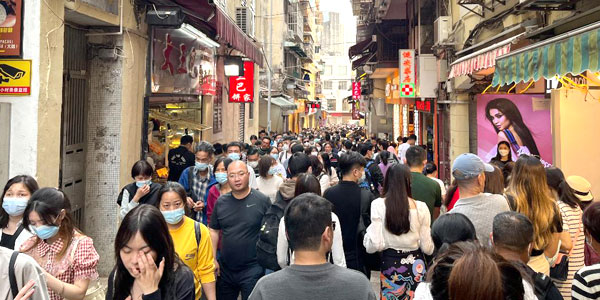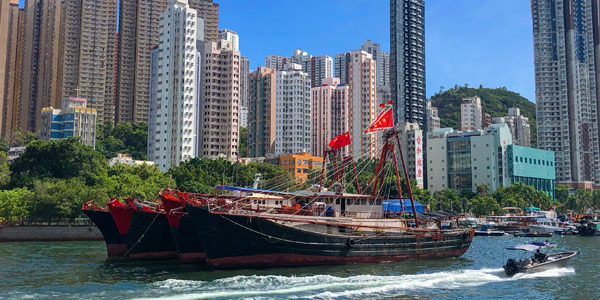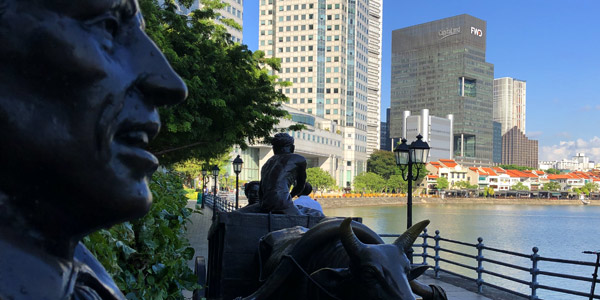|
COVID-19 AND THE ASIA TRAVEL RESTART HK, Macau drop masks; China travel starts; Taiwan opens; S'pore ends Covid rulesAsia makes a concerted effort to get travel moving again. Here's a roundup of the post-Covid restart in 2023. by Vijay Verghese Updated 2 May 2023 SEE ALSO Asia medical tourism | Travel health risks in Asia | Covid-19 leader forum | Asia tsunami history | Bali volcano updates | Behind the scenes - Staycations | Best Asian holidays in Covid times 
Macau heaves as post-Covid crowds throng alleyways leading to historic sights like St Paul's ruins and eateries at Taipa Village. Other heritage walks offer breathing space / photo: Vijay Verghese As the highly transmissible Omicron BA.2 virus variant along with BA.5 (three times more likely than BA.2 to land you in hospital) and BA.2.75 (Centaurus) continue to spread around the globe followed by XBB and the stealthy Chinese variants, BF.7 and BQ.1 (both offshoots of BA5), countries opening up are also braced for fresh waves. Testing requirements were creeping back early 2023 and the full opening across Asia is being watched with caution as travel picks up. China's abandonement of its zero-Covid policies and a restart of travel from 8 January 2023 drew a mixed response. China, South Korea and Japan sparred on entry requirements and there were tit-for-tat visa cancellations and border closures. By late January these had eased and on 29 January 2023 China and Japan resumed visa operations. By 30 January Hong Kong had announced an end to Covid quarantines in gussied up shipping containers at Penny's Bay (Lantau Island) though voluntary seven-day isolation remains available. Mandatory tests for foreign arrivals and quotas for Chinese entering the territory are being reviewed and are to be dropped soon. Meanwhile, short-term visa cancellations. USA require travellers from China (including Hong Kong and Macau) to possess a negative PCR or RAT (rapid antigen test) result within 48 hours of travel. The CDC is also proposing testing aircraft waste water to detect Covid-Omicron variants to get a handle on the emerging picture. Japan restriced flights from China and Hong Kong and asked for tests on arrival. Thailand did an about-face 7 January 2023 on open entry, demanding Covid tests and proof of vaccination, then did another u-turn on 9 January to go back to open doors. India and Italy too are screening arrivals from China with India also adding Hong Kong, Thailand, Japan and Singapore. Italy raised the alarm late December after a flight to Milan found over 50 percent of Chinese passengers testing positive for Covid. The EU threatened to hold out but was soon buckling as UK, Spain, France soon followed suit. A fast roundup of the latest Covid travel situation, restrictions and restarts around Asia. DESTINATIONS For a general statistical overview, the cleanly presented Global Covid-19 Index (GCI) offers data-driven at-a-glance insights into recovery, restrictions and lockdowns while the World Health Organisation has its worldwide Covid-19 dashboard. And the European Union has put up a useful site to help travellers plan EU travel with updated requirements from member countries. Travellers within Asia will need to look out as well for other seasonal ailments that have been elbowed off TV screens but remain a constant threat – dengue and mosquito-borne illnesses, assorted pneumonias, air pollution, and water-borne food-related bugs like cholera, typhoid, and hepatitis to name a few. See our Asian health risks report. AUSTRALIA & NZ Australia from 11 March 2023 dropped Covid test requirements for visitors from China, Hong Kong and Macau. The requirement for proof of a negative Covid test within 48 hours of travel had been in place since 1 January 2023. The country restarted international travel 21 February 2022 after a closure of almost two years since March 2020. Entry is open for all vaccinated travellers (with two doses). More updates in the Australian Department of Health. unvaccinated travellers will need to undergo a 7-14-day quarantine. New Zealand by contrast on 4 January 2023 announced that China visitors would not need to show a negative Covid test upon arrival. This put it at odds with several countries including neighbour Australia. The country reopened quarantine-free to fully vaccinated travellers from visa-waiver countries 1 May 2022 (date brought forward from July). Travellers need proof of vaccination and a negative test immediately prior to travel. Visitors will receive two free rapid antigen tests (one for self administration upon arrival and the second for day six). Unvaccinated New Zealand nationals and residents (only) will undergo normal quarantines. CAMBODIA reopened quarantine-free to vaccinated travellers 15 November 2021 and by mid-March 2022 had dispensed with all Covid testing requirements. Visitors must have proof of full vaccination to avoid a 14-day quarantine. Cambodia boasts some of the highest vaccination rates in Asia and is betting on travel restart its economy as it adopts a 'living with Covid' approach. Visas-on-arrival are being reintroduced. This was an earlier Cambodian foreign ministry post in November 2021. CHINA dropped its zero-Covid policy late December 2022 and reopened its borders 8 January 2023. This, despite rising Covid numbers in the country, now without the benefit of regular statistical releases and accounting. From 8 January 2023 arrivalsto China simply require a negative test result within 48 hours of travel to the country. January saw tit-for-tat actions from China, South Korea and Japan, with short term visas being denied. In most other cases Quarantines have been abolished and there is no need to apply for an all-clear health QR code. The country had already slashed some curbs mid-November 2022 cutting quarantines from seven days to five (to be followed by three days of strict isolation at home with no stepping outside). Arrivals will need one negative PCR test within 48 hours of boarding their flight to China. By late June 2022 had reduced Covid curbs with government facility quarantines of seven days for all arrivals followed by three days home isolation. The previous arrangement was 14 days official quarantine plus seven days of home isolation making a total 21 days pf segregation. HONG KONG - By 1 March 2023, Hong Kong's mask mandate had been dropped, save for in certain high-risk areas. By 30 Januarythe city had announced an end to Covid quarantines in gussied up shipping containers at Penny's Bay (Lantau Island) though voluntary seven-day isolation remained available. Mandatory tests for foreign arrivals have been dropped along with the daily RAT tests for five days. On 26 September 2022 the city dropped hotel quarantines and opted for a three-day self monitoring at home (or hotel) for all arrivals. Travellers would need to administer themselves an RAT test 24 hours prior to boarding. Arrivals are tested (PCR) at the airport and can proceed straight home without waiting for results. They then need to do PCR tests on Days 2, 4 and 6 (with daily rapid antigen tests) after which they are at liberty to move freely anywhere. From Day 1 visitors may travel fairly freely (including on public transport) except into restricted mask-off areas like restaurants, bars, and beauty parlours. Face masks are a must at all times indoors and outdoors. On 12 August 2022 HK had introduced a vastly scaled back 3-day hotel quarantine combined with flexible 4-day home monitoring. Arrivals needed to take and report daily rapid antigen test results as well as submit to a sequence of PCR tests running up until the ninth day. But once out of the hotel, visitors and returning residents may visit their offices, use public transport, and visit shops (with a yellow code on their Leave Home Safe app). The cautionary yellow colour reverts to a blue 'all clear' upon completion of the full period. Visitors may not enter bars, restaurants of beauty parlours during their observation period. Social distancing rules are being steadily eased. More on Hong Kong quarantines and Covid test requirements. 
Fishing vessels idle and motorboats make waves at Aberdeen Marina as Hong Kong opted to end hotel Covid quarantines and then dropped masks from March 2023/ photo: Vijay Verghese INDIA restarted international flights 27 March 2022 after a two year shutdown. By December 2022 movement was fairly unrestricted and PCR tests had been scrapped for inbound passengers though vaccination status was being checked. By January 2023 negative Covid tests were required for travellers coming from China, Hong Kong, Thailand and Japan. There is no quarantine requirement. By December 2022 arriving travellers were no longer required to fill out health declaration Air Suvidha forms. Travellers must however monitor their health.. E-visas are once again open for application. INDONESIA & BALI - By late May 2022 Indonesia had dropped PCR tests and rapid antigen tests for fully vaccinated travellers (with two shots) and dispensed with masks outdoors. Masks wre still required on public transport or in certain crowded situations. Visas on arrival are available. In late April 2022 Indonesia had announced quarantine-free entry for international visitors providing proof of full vaccination, a PCR test within 48 hours of the flight, and Covid insurance of US$25,000. Four nightshad to be booked in advance at a CHSE certified hotel. In Bali, quite a few quality hotels and villas (like Ritz-Carlton, Ayana, Conrad, Bvlgari, InterCon and St Regis) are on the CHSE list so you may have ended up simply staying at your booked hotel. For the curious, CHSE stands for 'Cleanliness, Health, Safety, and Environmental Sustainability'. JAPAN By late May 2022 Japan was testing arrivals in the form of small tour groups (accompanied by a tour guide) from Thailand, Singapore, USA and Australia. Visitors need to have a triple vaccination certificate and adequate medical insurance. By June a further relaxation took place with Hong Kong added to the approved tour list. By 11 October 2022 private travellers (non group) were welcome and the arrival cap of 50,000 passengers was dropped. Visa waivers are back for select countries. Those without the required three vaccinations need a negative PCR test issued 72 hours before boarding. Japan will start using a new vaccination especially for the Omicron BA.5 variant that is sweeping the country. Do note that Japan recognises Pfizer, Moderna and Novavax for booster shots, and approved first shots include AstraZeneca, Bharat Biotech anf Janssen. Japan had earlier bared all foreign visitors and served up tough quarantine measures from 30 November 2021 over Omicron fears. By March 2022 there were some changes to the rules for those arriving on business "under the supervision of receiving organizations". All earlier visas remain cancelled. MACAU like Hong Kong has opened gradually since late 2022 and on 27 February 2023 dispensed with its mask mandate as well. Masks are still required on public transport. The city is bustling with newfound vigour. Earlier, travellers required a 14-day quarantine with further self-checks till day 21. Proof of vaccination was required. And passengers had to produce a negative RT-PCR test confirmation dated less than 24 hours prior to emplaning. MALAYSIA threw open its doors 1 April 2022 to all fully vaccinated travellers with a negative tests in hand. Proof of vacination was required and a Covid-19 RT-PCR test within two days of boarding the inbound flight. By September, all inbound (and post arrival) test requirements had been scrapped for vaccinated and unvaccinated travellers. More updated details on Malaysia travel. The country had earlier in a test run opened Langkawi to vaccinated international visitors from countries deemed 'safe' in mid-November 2021. Unvaccinated arrivals had to undergo a five-day quarantine. Downloading the health app MySejahtera is not a must. Masks must be worn on public transport. MALDIVES opened the door to foreign travellers 15 July 2020 and by 13 March 2022 the 'public health emergency' declared on 12 March 2020 had been revoked. PCR testing is not required for arriving passengers but a PCR test is recommended within three to five days of arrival. There are no quarantines and masks are only mandatory in health facilities or in prescribed zones. 
Singapore remains a top draw for post-Covid travel and transits / prhoto: Vijay Verghese MYANMAR reopened to international visitors after a two year hiatus on 17 April 2022. By June 2022 Myanmar's e-visa was back in operation and business flights had commenced from SE Asia. Restrictions remain. Travellers need adequate insurance, vaccination proof, and a PCR test within 72 hours of travel. There is a rapid antigen test on arrival as well. Those with positive results need to quarantine at a hotel at their cost with any treatment covered by insurance. The brutal February 2021 coup by the military remains a significant damper on travel. NEPAL- By 8 January 2023, Nepal - worried at the Covid spike in South Korea and China - demanded proof of vaccination or a negative PCR test from all international arrivals. In October 2021 the country had reopened without quarantines to fully vaccinated foreigners. The country continues to open cautiously and pre-departure PCR tests have been done away with. Further sweeteners were in place by April 2022 for special discounts on domestic flights and 20 percent discounts offered by members of the Hotel Association of Nepal to international visitors. Nirmal Purja, the outstanding Nepalese mountaineer who summited 14 of the world's highest peaks recently in an amazingly short span of time has been appointed a goodwill ambassador for Nepal. PHILIPPINES - Philippines reopened to vaccinated travellers from over 150 visa-free entry countries 10 February 2022 ending a two-year shutdown. By 1 April the door was open to all fully vaccinated visitors. There is no longer any need for an Entry Exemption Document (EED). On 30 May 2022 the PCR tests were dropped for fully vaccinated travellers over 18. There is no government quarantine. Earlier, international arrivals had to show a negative Covid-19 PCR test (dated within 48 hours of boarding) and they were required to self-monitor for seven days. Unvaccinated travellers need to quarantine in a government facility and successfully test negative on day 5. After this they will have to quarantine at home until day 14. SEYCHELLES - As early as 1 June 2020, the Indian Ocean islands of Seychelles were open to arrivals from 19 countries including Thailand, Japan, China and New Zealand. Private charter flights were open shortly after. By April 2022 foreign arrivals were significantly up. Unvaccinated travellers are required to produce a negative PCR test within 72 hours (or a rapid antigen test) within 24 hours of emplaning for Seychelles. Masks are mandatory in public. SINGAPORE - On 13 February 2023, a day before Valentine's, the city state dropped all Covid restrictions for visitors (including pre-boarding tests for non-vaccinated visitors) and opened travel full throttle. The mask mandate was lifted save for in hospitals. Public transport does not require masks. Eearlier, the Ministry of Foreign Affairs had an updated post on Covid-19 travel restriction and regulations. From 1 April 2022 the Vaccinated Travel Lanes (VTLs) were retired and fully vaccinated travellers (and children under 12) were allowed in quarantine-free in a return to normalcy. Visitors do not ned pre-arrival or post-arrival testing. The city has also relaxed its social distancing requirements. All arriving passengers need to have downloaded the city's ' TraceTogether' app to verify vaccination status at least three days before landing in Singapore. SOUTH KOREA by 7 January 2023 had gone back to a mandatory requirement for visitors from China, Hong Kong and Macau to get negative PCR tests results within 48 hours of travel. in mid-October 2021, the country started relaxing stringent controls on social gatherings in a new "living with Covid-19" strategy. Korean Air has a frequently updated page on inbound traveller requirements in Covid times. Here is the government update page. Make sure you have a valid K-ETA, visa or an APEC business travel card. The mandatory self-quarantine came down from 10 days to seven on 4 February 2022. Residents can undertake the quarantine at home and those without a domestic residence will be quarantined at a government facility (with a price set at W1,500,000). Do note that all visas issued before 5 April 2020 have been cancelled. SRI LANKA started welcoming international visitors once again from 1 August, 2020, and the journey promises to be fairly trouble-free. By March 2022 PCR tests and rapid antigen tests had been done away with. Proof of vaccination is required - in English. SriLankan Airlines has an updated page on Covid travel protocols. TAIWAN opened fully to individual visitors from Hong Kong and Macau on 20 February 2023 (three years after closing borders) though some restrictions remained for China (PCR test 48 hours from travel or an RAT test 24 hours before travel plus a saliva PCR test upon arrival). It is hoped China may see a relaxation in terms from spring. More from Hongkong Airlines. Taiwan resumed visa-free inbound travel to citizens from eligible countries starting 29 September 2022. PCR tests had been dropped but there was a three-day quarantine with four more days of self monitoring. By mid-October 2022 quarantines were dropped and in January 2023 self-monitoring with rapid antigen tests introduced. China Airlines has a dedicated page on Covid travel and quarantine updates for Taiwan. More Covid information at the Taiwan Centers for Disease Control. THAILAND - With China travellers returning, the country did an about-face 7 January 2023 on Covid entry, demanding tests and proof of vaccination, then did another u-turn on 9 January to go back to open doors. Thailand scrapped its Thailand Pass and Covid-19 tests as of 1 July 2022. Arrivals still need proof of vaccination. Nightspots have also been allowed to open till 2am. Unvaccinated travellers need to show proof of negative tests - Rapid Antigen or PRO-ATK - taken less than 72 hours before travel. Mask wearing is optional (not mandatory) and visitors are advised to use common sense. From October 2022, Thailand will downgrade Omicron to the same category as influenza and dengue, no longer regarding it as a highly hazardous communicable disease (like plague or smallpox). Earlier, foreign arrivals to Thailand required a Thailand Pass (tp.consular.go.th/) but the requirements had been simplified. Travellers had to provide passport and vaccination details along with US$10,000 medical insurance. A Thailand Pass QR code was then issued. The unvaccinated of those not as yet fully vaccinated had to upload proof of a negative RT-PCR test or competent ATK procedure within 72 hours of travel. On 1 July 2021 the country had trialled the novel Phuket sandbox approach with entry opened for fully vaccinated persons from countries deemed medium or low risk. They needed a visa and a 'certificate of entry' from a Thai embassy and they were required to have travel insurance worth US$100,000 (later brought down to US$20,000). Visitors were required to stay at least seven days on the island at an approved certified SHA hotel and then undergo one more PCR test before travelling on quarantine-free to places like Krabi, Phangnga, Samui, Chiang Mai, and Prachuap Khiri Khan south of Hua Hin on the Gulf Coast. TURKEY had open borders to tourism from 1 July 2020 (though the country has had some spikes since then) bundled with a "Safe Tourism" programme that includes a 15-Euros insurance (offering 3,000 Euros of medical coverage) upon arrival. By March 2022 inbound travel was still open to those (above the age of 18 years) with a negative PCR test 72 hours prior to travel. Visitors must have an HES health tracking application to register on their mobile phones. By April 2022, arrivals from 'high risk' countries were required to quarantine for 10 days at their own expense. UAE - Dubai had opened its doors cautiously August 2020 with vigorous protocols in place at points of entry. Vaccinated passengers arriving April 2022 onwards need negative Covid-19 certificates (PCR within 72 hours of boarding and rapid antigen within 24 hours) and may face testing upon arrival. International health insurance is "mandatory". Vaccinations will have to have been completed at least 14 days prior to arrival. Proof of Covid recovery is permissible as well. VIETNAM threw open the country to international tourists from 15 March 2022 with no quarantine or self-isolation requirement for fully vaccinated travellers. Along with insurance cover of at least US$10,000, arrivals earlier need to produce a negative Covid-19 test result (RT-PCR/RT-LAMP within 72 hours of arrival or a negative rapid antigen test result within 24 hours). By late May 2022 Covid tests had been dispensed with. Visitors may need to download a local health app for access into some places. Children under two are exempt from these requirements. It was earlier planned to route foreigners through remote island and beach destinations like Phu Quoc in the far south in order to restrict imported Omicron cases. This idea was eventually shelved in favour of a countrywide opening.
NOTE: Telephone and fax numbers, e-mails, website addresses, rates and other details may change or get dated. Please check with your dealer/agent/service-provider or directly with the parties concerned. SmartTravel Asia accepts no responsibility for any inadvertent inaccuracies in this article. Links to websites are provided for the viewer's convenience. SmartTravel Asia accepts no responsibility for content on linked websites or any viruses or malicious programs that may reside therein. Linked website content is neither vetted nor endorsed by SmartTravelAsia. Please read our Terms & Conditions. |


